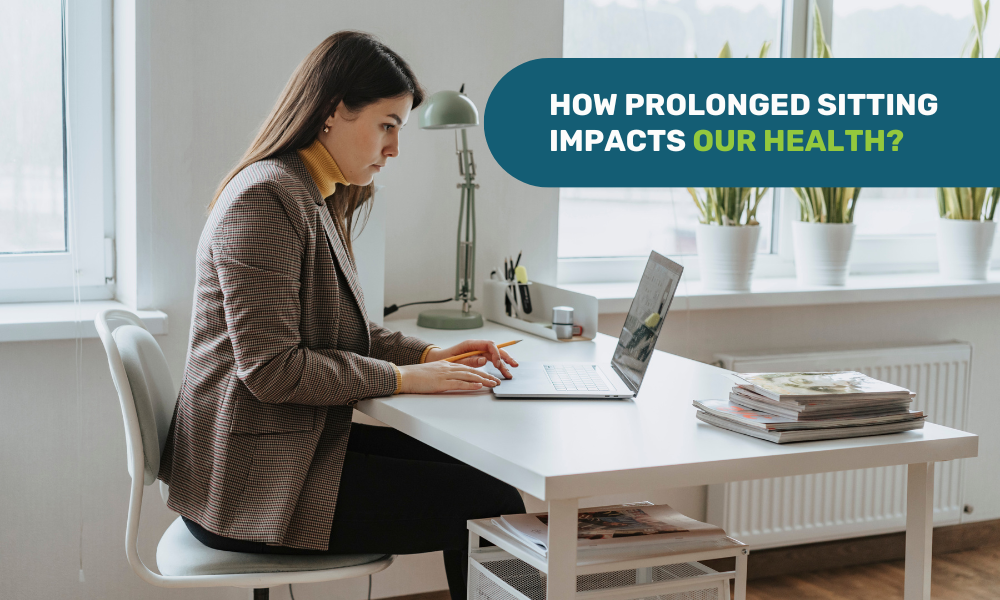Most of us spend much of our time hunched over a computer keyboard during the day, which can cause pain and stiffness in our necks and shoulders.
In the modern era of sedentary lifestyles and desk-bound work, the consequences of prolonged sitting have become increasingly apparent. We spend extended hours each day in the same position at a desk or in front of a screen; this may affect our health adversely. Our bodies are designed for movement. However, our body’s response to prolonged periods of immobility can be shocking.
Prolonged sitting can have a musculoskeletal impact, leading to muscle stiffness, particularly in the neck, shoulders, and lower back. It may contribute to poor posture and the development of muscle imbalances, along with reduced blood circulation. Prolonged sitting also weakens our muscles.
Our body might struggle with many other things because of prolonged sitting. Here are six health complications that prolonged sitting may cause.
-
Stiff neck and shoulders: Sitting hunched over a computer keyboard leads to pain and stiffness in our neck and shoulders. Physical inactivity has been observed as the fourth leading cause of death due to non-communicable diseases across the world. One must avoid sitting hunched over for a long time. There are simple exercises in physiotherapy that can help release stiffness in the neck and shoulder.
-
Hips and Back: Just like our legs and gluteals, our hips and back will not support us well if we sit for long periods. Prolonged sitting causes our hip flexor muscles to shorten, leading to problems in our hip joints. Sitting for long periods can also lead to problems in our back, especially if we consistently sit with poor posture. Poor posture may also cause several spine health complications, such as compression in the discs in the spine, leading to premature degeneration, which is very painful.
-
Diabetes: Lack of mobility can lead to increased insulin resistance, which may cause a spike in blood sugar levels. People who spend longer time sitting have a higher risk of developing diabetes than people who move around actively.
-
Weight: Moving our muscles helps our body digest the fats and sugars we eat. If we spend a lot of time sitting, digestion may be efficient, and we may retain fats and sugars in our bodies.
-
Deep vein thrombosis: Prolonged sitting for too long can lead to deep vein thrombosis (DVT). It is a blood clot that forms in the veins of our leg. What is more dangerous is that if part of a blood clot in the leg vein breaks and travels, it can interfere with the blood flow to other parts of the body, including our lungs, which can cause a pulmonary embolism. This is a serious medical emergency!
-
Anxiety and depression: The risk of both depression and anxiety is higher in people who sit for a longer time with minimum movement. This is because people who spend a lot of time sitting miss the positive effects of physical activity and fitness. Therefore, getting up and moving regularly may help.
Prolonged sitting may even increase the chances of an individual developing certain types of cancer, including lung, uterine, and colon cancers.
How to deal with the Health complications caused by prolonged sitting?
Here are some ways one can prevent health complications caused by prolonged sitting.
-
Walk or cycle, and leave the car at home while going to work.
-
One must get off the bus one stop early and walk the remaining way to one’s office or home.
-
Park away and walk rest of the way.
-
Use the stairs instead of the lift or escalator.
-
One must take short breaks every hour to stand up, stretch, or walk around, promoting better blood circulation and reducing muscle stiffness.
-
Walk over and talk to colleagues instead of using the chat option.
-
Take your lunch break away from your desk and enjoy a short walk outside.
-
One must ensure to do some form of physical activity. It can be anything from walking to dancing or even doing yoga.
-
Adjust your chair and desk to support a neutral spine position, and consider using a standing desk to alternate between sitting and standing.
Lastly, one must not ignore stiffness in muscles. In case of any stiffness, one must consult a physiotherapist who can help manage the pain and improve mobility. To consult a physiotherapist, CLICK HERE.





